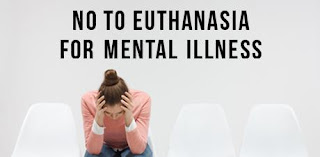Contact your member of parliament to reject the Senate amendments and Bill C-7. Members of Parliament contact list: https://www.ourcommons.ca/Members/en/search
Alex Schadenberg
Executive Director, Euthanasia Prevention Coalition
Last week I reported that Canada's Senate passed Bill C-7, the bill to expand Canada's (MAiD) euthanasia law, with dangerous amendments that further expands the law.
Sign the petition: No to euthanasia for mental illness and incompetent people! (Link)
Bryden also reported that the government has rejected the Senate amendment permitting euthanasia for incompetent people who have requested death in their advanced directive. Bryden reported:
As bad as Bill C-7 was, the Senate passed five amendments to Bill C-7. The primary amendments were expanding euthanasia to people with mental illness alone (with an 18 month reprieve for the federal government to develop rules) and incompetent people who had requested death in their advanced directive.
By passing Bill C-7 with amendments, the bill went back to parliament for debate on the amendments.
Joan Bryden, reported for the Canadian Press that the government accepted the most dangerous Senate amendment, that being, expanding euthanasia to people with mental illness alone, but with a 24 month reprieve to enable the federal government to develop guidelines. Bryden reported:
By passing Bill C-7 with amendments, the bill went back to parliament for debate on the amendments.
Joan Bryden, reported for the Canadian Press that the government accepted the most dangerous Senate amendment, that being, expanding euthanasia to people with mental illness alone, but with a 24 month reprieve to enable the federal government to develop guidelines. Bryden reported:
The Trudeau government has agreed with the Senate that Canadians suffering solely from grievous and incurable mental illnesses should be entitled to medical assistance in dying — but not for another two years.
The two-year interlude is six months longer than what was proposed by senators.Since this is a minority government, it is possible that members of parliament will reject this amendment.
The mental illness alone amendment felt like a "set-up" after Justice Minister, David Lametti, announced on November 24 that, once Bill C-7 passed, he wanted to expand euthanasia to people with mental illness alone.
With a minority government, parliament is able to reject the Senate amendments.
The government has rejected another Senate amendment that would have allowed people who fear being diagnosed with dementia or other competence-eroding conditions to make advance requests for an assisted death.If the House of Commons approves the government's response, the bill will go back to the Senate, where senators will have to decide whether to accept the verdict of the elected chamber or dig in their heels.
It has also rejected one other amendment and modified two others in a motion that is to be debated today in the House of Commons.
The Senate had no right to consider expanding euthanasia to people who request death in their advanced directive since the issue was not even studied by the House of Commons or Senate hearings on Bill C-7. The Senate simply reacted to an emotionally compelling speech by Senator Wallin.
What did Bill C-7 do before it was amended?
1. Bill C-7 removes the requirement in the law that a person’s natural death be reasonably foreseeable in order to qualify for assisted death. Therefore, people who are not terminally ill can die by euthanasia. The Quebec court decision only required this amendment to the law, but Bill C-7 went further.
2. Bill C-7 permits a doctor or nurse practitioner to lethally inject a person who is incapable of consenting, if that person was previously approved for assisted death. This contravenes the Supreme Court of Canada Carter decision which stated that only competent people could die by euthanasia.
3. Bill C-7 waives the ten-day waiting period if a person's natural death is deemed to be reasonably foreseeable. Thus a person could request death by euthanasia on a "bad day" and die the same day. Studies prove that the “will to live” fluctuates.
4. Bill C-7 creates a two track law. A person whose natural death is deemed to be reasonably foreseeable has no waiting period while a person whose natural death is not deemed to be reasonably foreseeable would have a 90 day waiting period before being killed by lethal injection.
5. As stated earlier, Bill C-7 falsely claims to prevent euthanasia for people with mental illness. The euthanasia law permits MAiD for people who are physically or psychologically suffering that is intolerable to the person and that cannot be relieved in a way that the person considers acceptable. However, mental illness, which is not defined in the law, is considered a form of psychological suffering.
Bill C-7 went much further than the Quebec Superior Court Truchon decision and now the Senate has made it worse.
Join more than 52,000 people who have signed the petition: Reject euthanasia Bill C-7 (Link).
Contact your member of parliament to reject the Senate amendments and Bill C-7. Members of Parliament contact list: https://www.ourcommons.ca/Members/en/search



2 comments:
So who exactly are the wise sages who will deem who is mentally ill or not and qualifies to be put down? Trudeau himself or a lackey?
Yesterday my brother's and my op-ed was published in the Hamilton Spectator. It addresses this topic.
https://www.thespec.com/opinion/contributors/2021/03/09/maid-changes-deny-suicide-prevention-help.html
Post a Comment